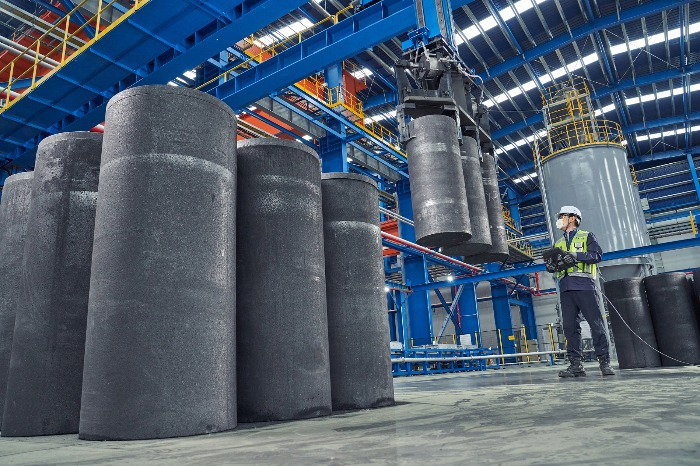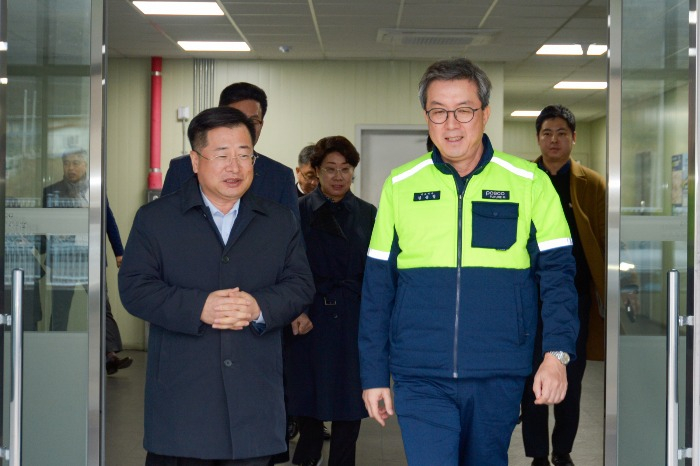Batteries
POSCO Future M to sharply raise synthetic graphite output
The battery material supplier is the sole synthetic graphite producer in South Korea
By Jan 17, 2024 (Gmt+09:00)
2
Min read
Most Read
MBK’s Korea Zinc takeover attempt to spur search for white knights


Korea Zinc, MBK face proxy war for zinc smelter


Korea Zinc shares skyrocket after buybacks in tender offer


Lotte to liquidate rubber JV in Malaysia, sell overseas assets for $1 bn


Samsung to unveil 400-layer bonding vertical NAND for AI servers by 2026



South Korea’s POSCO Future M Co. will sharply raise its synthetic graphite production by the end of 2025 as China’s export restrictions on graphite and policy efforts by the US and Europe to reduce their reliance on Chinese minerals are expected to boost demand for the critical EV battery material produced in Korea.
POSCO plans to increase its production capacity of synthetic graphite to 18,000 tons by the end of 2024 from the current 8,000 tons per year, according to the company on Wednesday.
It will further expand the capacity next year, more than doubling the 2024 level. To that end, POSCO will invest an additional 400 billion won ($300 million) by the end of next year.
It unveiled the plan during a visit by Kang Kyung-sung, vice minister of the Ministry of Trade, Industry and Energy, to POSCO Future M’s synthetic graphite factory in Pohang, about 260 kilometers southeast of Seoul.
The capacity expansion is part of its plan to invest 12.1 trillion won in its secondary battery business by 2027, announced last year.
POSCO Future M is now reviewing an additional investment of 3.1 trillion won into the Pohang plant.

POSCO Future M operates a synthetic graphite factory within a manufacturing campus in the city of Pohang. The area was designated as a special industrial complex for secondary batteries last year.
The factory is the only synthetic graphite-producing facility in South Korea. The unit of the steel giant POSCO Group uses coal tar, a by-product derived from the steel-making process, as a raw material.
The Pohang complex has the entire manufacturing cycle for secondary batteries from mineral processing and producing precursors, anode materials and cathode materials to recycling.
"Secondary batteries, along with semiconductors, are the future growth engine of the Korean economy and are a high-tech industry directly related to our economic security, so we must secure a strong supply chain for the industry,” Kang told reporters in a news conference on Wednesday.
He said the government will offer 5.9 trillion won worth of policy financing to rechargeable battery companies this year, alongside tax benefits and infrastructure upgrades.
POSCO Future M is expected to benefit from the US Inflation Reduction Act (IRA) and the European Union's Critical Raw Materials Act (CRMA), both aimed at containing China’s influence, particularly in high-tech industries such as electric vehicles, renewable energy products and their key minerals.
Write to Sang-Hoon Sung at uphoon@hankyung.com
Yeonhee Kim edited this article.
More to Read
-
 BatteriesChina’s graphite export curbs deal blow to Korean battery sector
BatteriesChina’s graphite export curbs deal blow to Korean battery sectorOct 20, 2023 (Gmt+09:00)
3 Min read -
 BatteriesKorea’s battery trio aims to outsmart Chinese rivals in US
BatteriesKorea’s battery trio aims to outsmart Chinese rivals in USOct 16, 2023 (Gmt+09:00)
3 Min read -

-
 BatteriesPOSCO Future M spurs single-crystal cathode production
BatteriesPOSCO Future M spurs single-crystal cathode productionJul 23, 2023 (Gmt+09:00)
3 Min read -
 BatteriesPOSCO Future M to inject $461 mn to bulk up cathode production
BatteriesPOSCO Future M to inject $461 mn to bulk up cathode productionApr 24, 2023 (Gmt+09:00)
2 Min read
Comment 0
LOG IN


